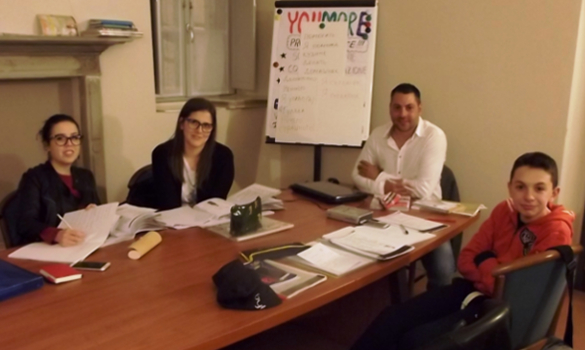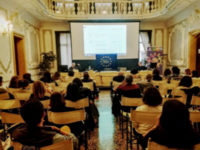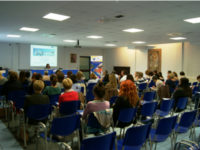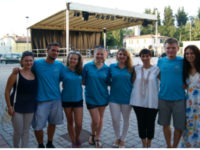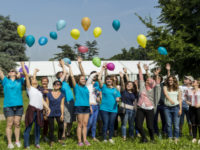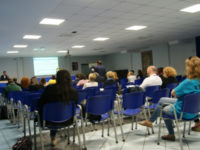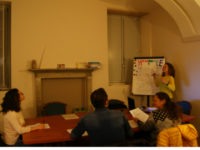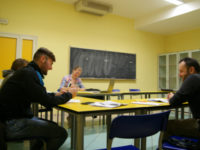Questo post è disponibile anche in: Italian
3 May the basic course of Russian language was finished. The course was promoted among different national projects by Eurodesk Agency of Chiari – Youmore Morcelli Giovani. The beginner level started 16 February, when Uliana Bychkova, a native speaker, opened the first lesson. The course had 12 lessons every Tuesday and there were 4 participants: Alessandra Carminati, a student of modern foreign literature, Dario Traversi, a student at Plesso Morcelli; Davide Simoni, an electrician, and Denise Gozzini who graduated linguistic department and also has got a degree in Communication and Information at the University of Bergamo.
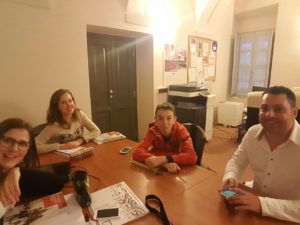 “To become familiar with Russian Cyrillic alphabet, – Uliana Bychkova explains – every lesson we started with interesting tongue twisters. This method is informal and it helps to keep students’ attention and overcome some difficulties in the beginning. Through the lessons the students studied some grammar topics and they also acquired important skills in conversations. Besides, we used some simulating games to expand our vocabulary. For example, we learned how to book a room in the hotel, how to order in the restaurant, how to ask information in a city and many other things. To get into Russian culture we’ve read some parts from the poem “Ruslan and Ljudmila” (by A. Pushkin, XIX century).
“To become familiar with Russian Cyrillic alphabet, – Uliana Bychkova explains – every lesson we started with interesting tongue twisters. This method is informal and it helps to keep students’ attention and overcome some difficulties in the beginning. Through the lessons the students studied some grammar topics and they also acquired important skills in conversations. Besides, we used some simulating games to expand our vocabulary. For example, we learned how to book a room in the hotel, how to order in the restaurant, how to ask information in a city and many other things. To get into Russian culture we’ve read some parts from the poem “Ruslan and Ljudmila” (by A. Pushkin, XIX century).
During our lessons we discussed some typical dishes from Russian 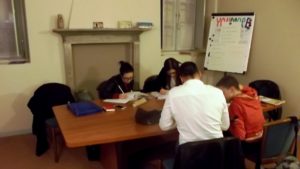 cuisine. Among them there were borsch – a red soup from beet-root, okroshka – a cold soup, which you eat during summer and the base for the soup is kvas, a drink made from brown bread. As well we talked about Russian dessert like bliny (like crepes and you can eat it with some jam or caviar), syrniki (small pancakes cooked from cottage-cheese, which served with smetana, sour-cream). Russians have some receipts from the ancient time; for example, the famous cake “Ptichie moloko”, which translated word-for-word like “The milk of the bird”. Another typical sweet is Vatrushka, kind of donut, cooked with cottage-cheese, and this sweet is more ancient among other sweets in my country”.
cuisine. Among them there were borsch – a red soup from beet-root, okroshka – a cold soup, which you eat during summer and the base for the soup is kvas, a drink made from brown bread. As well we talked about Russian dessert like bliny (like crepes and you can eat it with some jam or caviar), syrniki (small pancakes cooked from cottage-cheese, which served with smetana, sour-cream). Russians have some receipts from the ancient time; for example, the famous cake “Ptichie moloko”, which translated word-for-word like “The milk of the bird”. Another typical sweet is Vatrushka, kind of donut, cooked with cottage-cheese, and this sweet is more ancient among other sweets in my country”.
A variety of different topics and innovative pedagogical methods make this course attractive to get into Russian traditions. These four students have a chance to come back to Youmore Morcelli Giovani in October to start a new course of Russian language – the intermediate one.

